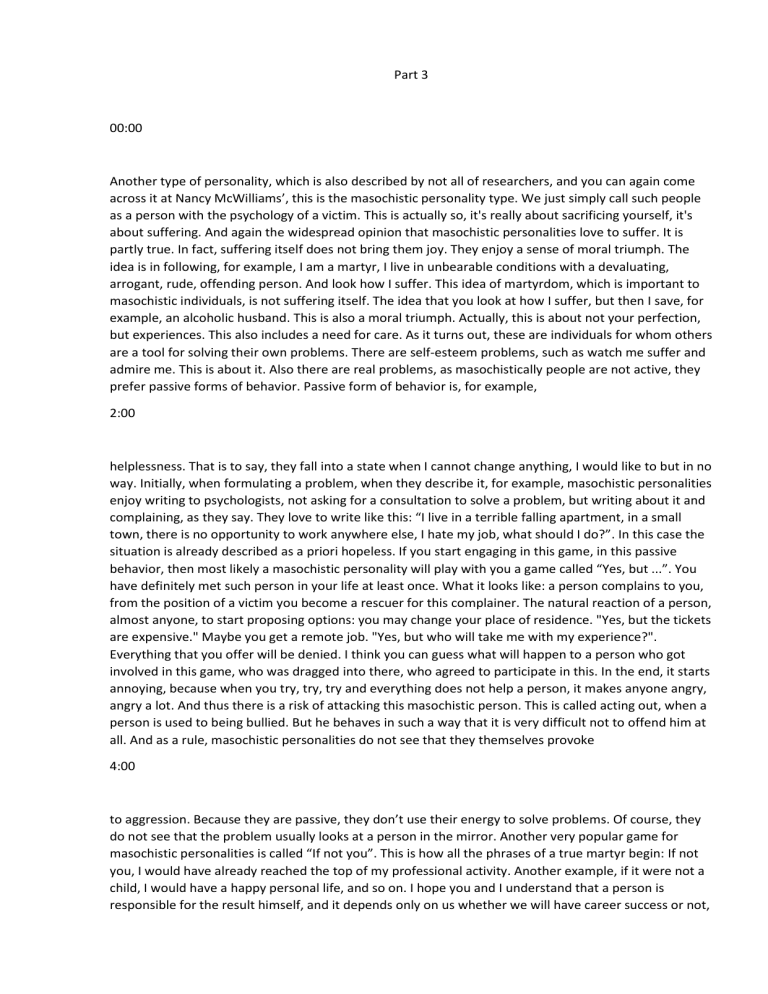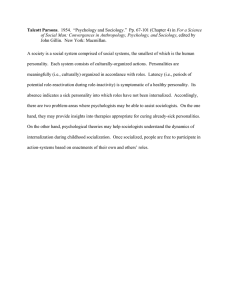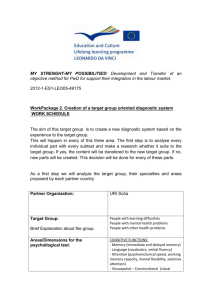
Part 3 00:00 Another type of personality, which is also described by not all of researchers, and you can again come across it at Nancy McWilliams’, this is the masochistic personality type. We just simply call such people as a person with the psychology of a victim. This is actually so, it's really about sacrificing yourself, it's about suffering. And again the widespread opinion that masochistic personalities love to suffer. It is partly true. In fact, suffering itself does not bring them joy. They enjoy a sense of moral triumph. The idea is in following, for example, I am a martyr, I live in unbearable conditions with a devaluating, arrogant, rude, offending person. And look how I suffer. This idea of martyrdom, which is important to masochistic individuals, is not suffering itself. The idea that you look at how I suffer, but then I save, for example, an alcoholic husband. This is also a moral triumph. Actually, this is about not your perfection, but experiences. This also includes a need for care. As it turns out, these are individuals for whom others are a tool for solving their own problems. There are self-esteem problems, such as watch me suffer and admire me. This is about it. Also there are real problems, as masochistically people are not active, they prefer passive forms of behavior. Passive form of behavior is, for example, 2:00 helplessness. That is to say, they fall into a state when I cannot change anything, I would like to but in no way. Initially, when formulating a problem, when they describe it, for example, masochistic personalities enjoy writing to psychologists, not asking for a consultation to solve a problem, but writing about it and complaining, as they say. They love to write like this: “I live in a terrible falling apartment, in a small town, there is no opportunity to work anywhere else, I hate my job, what should I do?”. In this case the situation is already described as a priori hopeless. If you start engaging in this game, in this passive behavior, then most likely a masochistic personality will play with you a game called “Yes, but ...”. You have definitely met such person in your life at least once. What it looks like: a person complains to you, from the position of a victim you become a rescuer for this complainer. The natural reaction of a person, almost anyone, to start proposing options: you may change your place of residence. "Yes, but the tickets are expensive." Maybe you get a remote job. "Yes, but who will take me with my experience?". Everything that you offer will be denied. I think you can guess what will happen to a person who got involved in this game, who was dragged into there, who agreed to participate in this. In the end, it starts annoying, because when you try, try, try and everything does not help a person, it makes anyone angry, angry a lot. And thus there is a risk of attacking this masochistic person. This is called acting out, when a person is used to being bullied. But he behaves in such a way that it is very difficult not to offend him at all. And as a rule, masochistic personalities do not see that they themselves provoke 4:00 to aggression. Because they are passive, they don’t use their energy to solve problems. Of course, they do not see that the problem usually looks at a person in the mirror. Another very popular game for masochistic personalities is called “If not you”. This is how all the phrases of a true martyr begin: If not you, I would have already reached the top of my professional activity. Another example, if it were not a child, I would have a happy personal life, and so on. I hope you and I understand that a person is responsible for the result himself, and it depends only on us whether we will have career success or not, whether we will have a happy personal life or not. And no children, of course, can prevent this. But masochistic people find someone to hang the responsibility for their failures that they experience. And they shift all the time, either to their relatives, or to the country, or to friends, or to a psychologist. "Tell me, doctor what should I do?" is also a masochistic request. And if you want to anger any psychologist, ask him the question “What to do?”. Because psychologists have no right to answer it, we have no right to give advice. But masochistic personalities demand for them with all their might. Another game that I have already described in a nutshell. This game is called “Kick Me”. This personality behaves in such a way as to provoke aggression. This is not only about asking for advice, and then not using this advice, not following it. They say it’s not all they need. They can also behave differently, for example, they can be late for a class and come into a lecture room during the lecture, drop everything, saying “Sorry, sorry, sorry”. Such a person would apologize dramatically. This way, he's distracting more people from apologizing 6:00 than when he entered noisily. And then he will ask everyone to make him way, so that they give him an opportunity to sit down, he will affect other people by this and that will cause aggression. This also fits well into the picture of a masochistic personality type. That is, they create situations in this way where aggression from the environment will fall on them. Of course, since this masochistic personality, they can often do self-harm, they can often find themselves in situations that will be dangerous for them. This is the same “Kick Me” game. There can be very serious consequences. A masochistic personality can choose, for example, as partners or friends such people who are inclined to deceive, attack and even be aggressive. And of course, it may not end well. I hope that it’s quite clear with a masochistic personality type. Probably, the most important thing that you can remember about them is that their main task is not to solve the problem, but to win a moral triumph. That is, to create a situation when poor they would be tormented by someone. And they come up with a wide variety of ways in order to create this picture. Of course, you want to be angry with people who are in this state, but no one does this on purpose. Well, almost no one, Ok. This type of personality is formed due to the fact that such a person has a very difficult background. And as the saying goes, " Only by living the life of dog, the dog is biting ." With any type of character, even of a pathological nature, exactly the same story.





